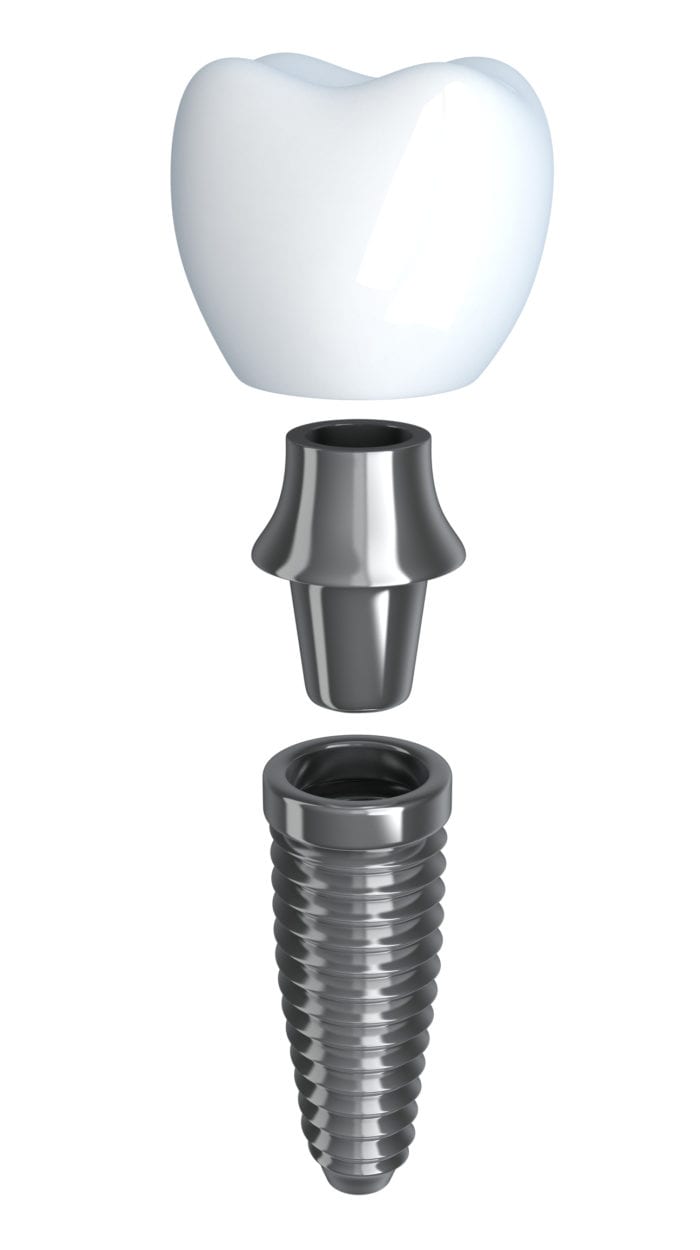A dental implant is an artificial tooth root that permanently fuses with the jaw bone. The implant post can anchor one or more replacement teeth. Dr. Scott Finlay is a talented implant dentist located in Annapolis, MD. He regularly uses dental implants in his practice to help patients efficiently and effectively replace their missing teeth.
If you suffer from missing or failing teeth, Dr. Finlay will create a treatment plan using dental implants. He customizes dental implants to your needs and goals.
We place the implant post in the jaw bone during the dental implant process. We provide anesthetic and sedation for pain-free treatment. After your implant heals, we place a connecter piece. Finally, once you are fully healed, we attach the crown, bridge, or denture. Dental implants use high-quality metal and porcelain materials for the strongest, longest-lasting result.

What is a Dental Implant?
A dental implant consists of three separate parts: the post, the abutment, and, finally, a custom-made dental restoration. Together, these parts can effectively replace one or more missing teeth. Our dentist works with you to ensure your implant fits the precise measurements and look of your natural teeth.
Learn more about the parts of a dental implant:
The Implant Post
The dental implant itself provides a strong base for the restoration. Implants are made of various materials, but titanium implants are the most popular.
Titanium is a type of metal that is biocompatible, meaning well-accepted by the human body. This metal is not heavy but still strong. The implant is similar to a small screw with threads.
We must surgically place the implant into the jaw bone. Depending on the type of restoration, we can use one to eight implants on an arch. Some restorations, including All-On-Four, use as few as four implants.
Once surgically implanted into the jaw, the titanium posts fuse with the surrounding bone. This healing process will create a stable base to secure the restoration. The implant post will serve as a tooth root replacement to help prevent bone loss.
As long as you properly care for your oral health, the titanium implant post should be permanent. The post will stay in the jaw bone like a natural tooth root.
The Abutment
An abutment is a small piece that connects the implant to the restoration. The abutment is made of metal and helps hold the false tooth in place. Additionally, this connector ensures the restorations do not slip from the mouth. We attach this piece after the implant completely fuses with the jaw bone.
Placing the abutment will require opening up the gums during a minor procedure. Afterward, you will need a few more weeks to heal before we can attach the permanent restoration.
The Prosthesis
The prosthesis, or restoration, is the final piece we attach to the implant post. A false tooth or false teeth will function like natural teeth. The type of restoration you need depends on the number and location of your missing teeth.
A dental crown will replace a single missing tooth. We recommend a dental bridge if you have several consecutive missing teeth. Partials restore rows of multiple missing teeth. We can create a custom-made complete denture for an entire arch of missing teeth. We can replace all your teeth in the upper and lower arches.
Dr. Finlay will create a custom restoration that will blend in naturally with the rest of your smile. He will take precise measurements and shade-match the remaining natural teeth or your desired tooth shade to your prostheses. Finally, Dr. Finlay will cement the crown, bridge, or denture to the abutment.
Who is a Candidate for Dental Implants?
We consider multiple factors before implant treatment. First, good dental health is essential to implant treatment. To reduce the risk of implant failure, we can treat gum disease and tooth decay before we place implants. Implants can fail if you do not properly care for your teeth and gums. Infection affects the stability of an implant post, leading to loose implants that may fall out of your mouth.
Smoking and tobacco products also increase the risk of implant failure. We will ask that you stop using tobacco during the 3 to 6-month implant process. The nicotine in tobacco restricts the blood vessels, which slows the implant healing process.
A healthy jaw bone is also essential for long-lasting dental implants. Bone loss is a common problem after you lose permanent teeth. Your jaw bone can begin to recede months to a year after you lose a missing tooth. As a result, you can experience facial sagging, making you appear older.
If you don’t have enough jaw bone for implant treatment, we recommend bone grafting. During this treatment, we will use donor bone or bone from another part of your mouth and place it where needed. Then, we place dental implants in the jaw bone. As the implants heal, the bone grows around them to create a stable new tooth root.
No patient is too old for implant treatment. You are a good candidate for implant surgery if you qualify for dental implants. We typically recommend dental implants for patients over 18 who do not smoke and are in good health. If you have concerns about your candidacy for treatment, please let us know at your next visit.
Get a Lasting Tooth Replacement
Choosing dental implants to replace missing teeth is easy once you understand the implant parts and how they work. No other tooth-replacement option is as sturdy as an implant restoration.
To start the implant process, schedule a dental implant consultation with Dr. Finlay at his Annapolis, MD, dentist’s office today. You can also call Annapolis Smiles for dental care at 410.989.7132.
Contact us if you have any questions about dental implants, the implant process, or the parts of an implant. We’re here to help.
Learn more about dental implants in our Annapolis office on our website:
